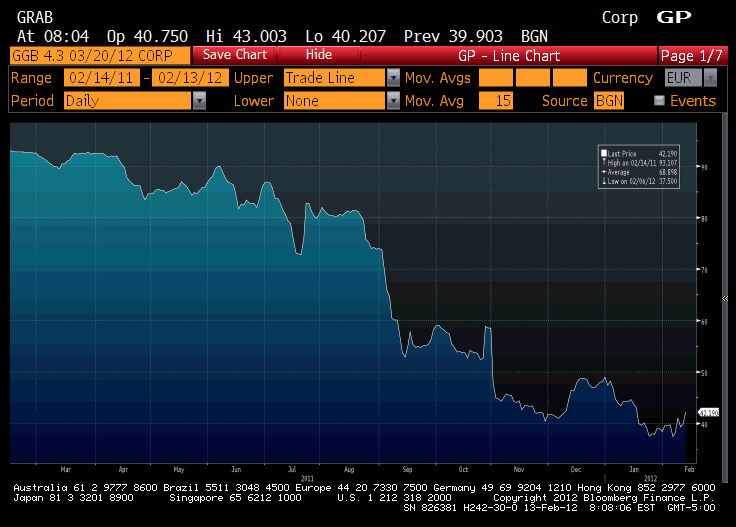Greek Bonds and PSI – Beware the Ides Of March (Or At Least The 20th)
So what is happening with PSI? Here is a chart of the Greek bonds due on March 20th. They have allegedly been trading up. I use the term “allegedly” because the bonds are supposedly quoted 2 to 4 points wide, on a million up. So not exactly a liquid market. But let’s assume the chart is reasonably close.
The March bonds are up a couple of points today. The May bonds trade at 33 and after that, all of the Greek bonds trade between 20 and 30, largely depending on coupon with a slight bias towards better prices for nearer term maturities.
So what is the PSI meant to do? Is the PSI meant to treat all bonds equally? If so, then it makes no sense for the March bonds to be trading at a significantly higher price. The ECB may own some of these bonds, and may be getting paid out at par, but that shouldn’t affect the price of non ECB held bonds. The payments and PSI aren’t pro-rata.
By all indications, PSI will chop the principal amount in half, and leave you with a small notional of long dated, low coupon bonds. Most estimates put the value of those long dated, low coupon bonds, between 50% and 70% of face. So the “NPV” loss shows up as around 70%. Maybe the percentage of people participating is high enough, the austerity is enough, and the EFSF kicker is enough to give the new bonds a value of closer to 90% of par, then a price of 45 for old bonds would be justified. But it would be justified for all bonds.
In the real world, bonds would exchange par plus accrued for the new bonds. So each bond would have a “claim”. So the bonds with the most accrued interest would have the most value. That is not the case here. Bonds with the shortest maturity have the most value. Is it possible that the PSI that has been cobbled together gives better payouts for bonds closer to maturity? That is possible. The IIF and Greece may have decided to pay more to shorter term bonds. It wouldn’t be standard, but on the other hand, the IIF isn’t exactly known for their bond restructuring expertise and experience.
So what else is happening here? Do investors hope to buy these bonds and guilt Greece into paying them out at par? Is the hope that the Troika will give Greece money, and Greece out of fear of default will use some of that money to pay holdouts from the PSI at par? That makes some sense, but isn’t the Troika supposed to wait for PSI before releasing money? Will they release the money if there are a lot of holdouts, particularly in this March bond?
Maybe it is simply a bet on the ineptitude of the politicians. Betting that they won’t finalize a PSI in time for the March 20th deadline, so will have to pay these off at par (remember, they just paid some bonds off at par in December). That bet also makes some sense. In “holdout” trade, you rely on Greece flinching and paying you out in spite of the message it sends to those who agreed to PSI. Under the “incompetence” trade you just need them to screw up enough that the PSI isn’t done and voted on before March 20th.
In any case, watch these short dated bonds both on an outright basis and versus the longer dated bonds. Right now, it looks like they are signaling some more monkey business coming up. Either the PSI is maturity weighted, or a decent number of investors are willing to bet that it will be profitable to holdout. Hopefully we see the PSI details soon and can make an assessment. It is possible the longer dated bonds are cheap, and I view increasing prices in the short-term bonds as signs of another round of headlines where the Troika gets mad at the private sector and it provides them with another reason to stop the bailout.
Main and IG have both drifted off their morning tights, but HY17 is still pretty much up there. Makes sense given resilience of that market. HYG caught up to HY17 on Friday and with the bounce in the actual bond market late day, actually closed “cheap” to fair value for the first time in recent memory. Given how illiquid the HY bond market is, it probably is technically still a bit rich, but worth watching this.

